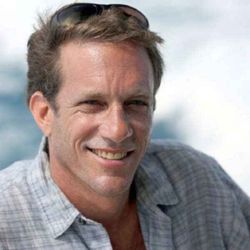Share

This Sustainable Life
498: What sets the limits on pollution? Why don't we pollute less or decrease faster?
My notes I read from:
Why do we still pollute, part 1: the questions
Does the following sound familiar?
- We use a lot of energy, but we’ll electrify everything and power them with wind and solar.
- Yes, we need to build a lot, but prices are cheaper than ever for renewable power and batteries. They fell faster than anyone expected and will keep falling. More solar energy hits the Earth daily than we need in a year.
- There are some problems, like that the sun doesn’t always shine, the wind doesn’t always blow, and we haven’t electrified some things, like heavy loaded trucks, airplanes, and container ships, but they’re just engineering issues that we’ll resolve.
- Nobody at the time of the Wright brothers could have predicted the 747. People a decade ago didn’t predict prices and capacity for renewables and batteries falling so fast.
- A world where we live like today just without carbon emissions is around the corner. All we have to do is wait, maybe fund some research.
Those ideas sound enticing and compelling. Why was everyone so gloomy?
What actually are the limits and why? The prices are lower but why not lower still? Is there a lower limit or do you believe it will drop to zero? Why aren’t we building more solar and wind farms? Why aren’t we damming more rivers? Why haven’t we electrified planes, boats, and for that matter more cars? If electric cars are better, why do people still buy internal combustion engine ones?
Something is setting those limits. What? Do batteries and electric vehicles only require we build more factories, in which case it’s only a matter of time, or are there limits that we can’t overcome? Maybe some we can overcome and some we can’t. If so, it matters which.
Also, I’ve written in my blog that humans have historically responded to new sources of power by using the old one and the new one. Our environmental problems aren’t too little power but too much pollution, just supplying new power doesn’t mean we stop using fossil fuels. Headlines keep touting record using of renewables, but the meaningful measure is how much we’re reducing pollution. We can easily keep building renewables and never stop burning coal and oil even if we can substitute.
Why aren’t we closing coal plants? Why do we keep using jet fuels for jets?
It’s tempting to believe that somewhere near the source of power supplies there are a few people or companies that are gearing up to supply what we need. Maybe they’re going as fast as they can. They’re just waiting for supplies or a few key technological developments.
You probably realize it’s not as simple as that. There are markets and market forces driving development and things get implemented as they can. When market forces drive some development, they do, but not all things respond to market development. For example, people knew about problems with pollution and the greenhouse effect for generations but didn’t act. Why now? Are there things that market forces can’t resolve or won’t address? You probably know about the Tragedy of the Commons, Jevons Paradoxes, and Rebound Effects, which are systems effects where markets produce the opposite goals people expect or desire. How significant are they?
Briefly, the tragedy of the commons occurs when private citizens benefit from using a resource that can be depleted but the public loses, for example overfishing the oceans, depleting aquifers, and polluting the atmosphere. Jevons Paradox is that when you make a technology more efficient, you decrease the pollution in each use, but by making it cheaper, more people use it more and for more things, so you may increase the total pollution. Rebound Effects are more broadly when our attempts to decrease pollution end up creating more, which might include replacing some business travel with video conferences, but then traveling for other reasons anyway, or traveling more for vacation with the time or money saved, resulting in more flights.
There are other effects too. Prices are supposed to cause markets to allocate resources, but in some cases they don’t. Fish that become scarce sometimes see higher prices, promoting fishing more scarce fish. Fishing technology makes fishing deeper and more aggressively cheaper, so the market sees more fish even though the ocean has fewer, to the point where fish find each other slower so reproduce slower.
What if these effects mean our solutions create problems greater than our problems?
If we don’t change our systems, these systems effects may overwhelm us. They’re easy to ignore, but what if they dominate our situation? What if our air becomes unbreathable? About ten million people a year die from breathing—a number greater than the six million Jews killed in the Holocaust and near estimates of how many people died in the Atlantic Slave Trade, over years and centuries. Pollution is killing that many per year, a number which is increasing, and we can’t stop that polluted air from dispersing all over the globe. If we keep increasing that pollution, might all of Earth’s air kill people globally? Besides dying, what would life be like if the whole globe is like Beijing or New Delhi all the time? Pollution doesn’t come only from carbon dioxide.
What other processes are we doing that pollute besides emitting greenhouse gases? What if renewables that lower greenhouse emissions don’t reduce other pollution? What if nuclear and fusion produce other pollution?
You know about the concept of embedded carbon—how much carbon was emitted in making something. We generally think if we use the thing enough, the one-time manufacturing hit averages down to negligible. What it it doesn’t? Cars don’t last forever. Even if electric vehicles last longer than internal combustion engine ones, what if the embedded carbon and other pollution in manufacturing it doesn’t become negligible over its lifetime, yet billions of people keep buying them year after year?
You might say, but we can bring down the embedded carbon by decarbonizing the manufacturing process. Can we? Are there limits to what we can decarbonize? While no one at the Wright brothers’ time could have imagined or predicted the 747, we can imagine a lot more that we can’t reach. We reached the Concorde and other supersonic flight, but pulled back from it. Why?
Just because we made advances in one field, does that mean we’ll produce the advances we want in another? We thought antibiotics and vaccines would stop pandemics, yet the current one has us more worried about a future one. This one may metastasize with another variant. The delta variant may continue to grow. Who knows if antibiotics will keep working?
I’m prompted to ask these questions all at once for two main reasons.
The first is that our media, business leaders, and politicians keep focusing on the march of progress on solutions. Partly, I love hearing about more renewables and how people replace business trips with video, but we don’t focus on shutting down polluting plants and we don’t pay attention to system effects. If you make a polluting system more efficient, you pollute more efficiently. That describes our world today. We use less effort to produce more pollution than ever. I can swipe my finger on a cell phone screen and causes a 2-ton vehicle to travel miles to bring food in containers that will poison wildlife for centuries, maybe millennia. That cell phone is billions of times more efficient than ENIAC or the computers that put people on the moon, but they drive server farms that pollute more than most nations. We pollute more with less effort than ever.
The second is that I’ve come across news that answers a lot of the questions, which I’ll talk about in part 2, but the news is more like the Concorde than the 747. That is, it looks like when we look at the engineering and details, we aren’t at the start of uncharted territories but at the ends of long lines of research reaching limits from the laws of physics.
Nobody wants technology to help us more than I do, but if we try to fight the laws of thermodynamics, we will lose. I talked to the chief engineer of a company that has won awards for developing battery powered planes. We recorded a podcast episode that’s in the editing pipeline so you’ll get to hear it from him. There is a rosy future for electric planes, just not carrying people across oceans. I’ve also read a few reports on technological limits I’ll summarize and link to in the next episode.
First, I wanted to pose the questions I’ve pondered that led me to pursue the answers enthusiastically. The answers matter. If potential solutions don’t work, the faster we pursue ones that can, the more likely we can succeed to some degree. We can’t bring back the ten million people who died in the past year from breathing air, nor the lives lost from past behavior that we can’t change, nor even the lives to be lost from results locked in for the next centuries. The people dying today are dying from past behavior. But we can change our behavior today to avoid killing people from our behavior. We wish past generations had changed. We can.
More episodes
View all episodes

844. 844: Maya Lilly, part 1: Effective Storytelling and Producing The Years Project
01:35:59||Ep. 844Since I've seen Maya's work on the Years Project with people like executive producers James Cameron and Arnold Schwarzenegger, I was worried I might feel starstruck.Oh wait, she also worked with series creators Joel Bach and David Gelber (of 60 Minutes); chief science advisors podcast guest Joseph Romm and Heidi Cullen; and episode hosts including Cameron, Schwarzenegger, Harrison Ford, Ian Somerhalder, America Ferrera, David Letterman, Gisele Bündchen, Jack Black, Matt Damon, Jessica Alba, Sigourney Weaver.Oh, and the series won an Emmy for Outstanding Documentary or Nonfiction Series.She was engaging, informative, open, and fun. We laughed a bunch We talked about her passion for the art and practice of storytelling. You have to be true to the science, but you can't skimp on the story or take for granted it will work. We also talked about her background that brought her to this level.The Years ProjectIts YouTube pageMaya's curated climate list
843. 843: Judith Enck, part 2: The Problem with Plastic (the Book)
28:43||Ep. 843Judith just published The Problem with Plastic: How We Can Save Ourselves and Our Planet Before It’s Too Late.I've read a lot about plastic and hosted many authors. I won't lie. Before starting the book, I thought I should read it because I knew her, but didn't expect much.Instead, I learned a lot new. I found it engaging and compelling. I recommend it.Yes, you'll learn things that are sobering, but you'd rather know than not know, especially things that affect your health and safety and your family's. It also guides you to how to respond, personally, socially, and politically. Judith cares and has experience.Start by listening to our conversation. Then read the book.The Problem with Plastic: How We Can Save Ourselves and Our Planet Before It’s Too LateWEBINAR with co-authors Judith Enck, Adam Mahoney, and Melissa Valliant, January 28, 2026
842. 842: Silvia Bellezza, part 1.5 and 2: When at first you don't succeed
39:44||Ep. 842Since Silvia teaches as a business school, I'll address a leadership aspect of our interaction. I skimped on a leadership step, so we did an episode 1.5, which is my lingo for redoing episode 1 when the person wasn't able to fulfill his or her commitment. That's my responsibility as leader of the interaction.Silvia and I had a wonderful first conversation that led to a commitment that sounded like she'd enjoy it and doable, but in the end wasn't quite. Even if a quick hike north of the city would be enjoyable, catching a Metro-North train from Columbia University isn't that convenient and her schedule may not have bee as flexible as she suspected in our first conversation.For those listening to these conversations to learn the Spodek Method, in our first conversation I didn't check with her how practical the commitment was given her constraints. As the leader of the interaction, I should have asked ahead to imagine her schedule, the logistics of catching the train, and so on. The key measure the first time someone acts on their intrinsic motivation isn't how big it is. It's if they person does it.When someone acts on intrinsic motivation, they'll find it rewarding. If they feel reward, they'll want to do it again and the next time will be bigger, especially if they've always considered acting on sustainability a sacrifice or something that has to be big or any of the other myths people propagate. Sadly, even ardent environmentalists lead people to think of acting more sustainably as something they won't like or won't find rewarding when they use tactics like trying to convince, cajole, coerce, or seek compliance.In this double episode we hear how she did something more practical. At the end, note that she's open to doing more.
841. 841: Sandra Goldmark, part 1: Fixation: How to Have Stuff without Breaking the Planet
41:57||Ep. 841How often does something break that you know could be fixed, but you don't know how and there are no places to fix it? I remember repair stores all over the place, but the field doesn't exist any more. We all know about planned obsolescence and how products are designed to break. Now we feel we have to throw things away and replace them (after avoiding buying things when possible, which is far more than most of us practice).Enter Sandra Goldmark, as a member of a growing movement to fix things and make things fixable. She's also an Ivy League professor at Barnard and the Columbia Climate School, so, no, professors don't have to be out of touch.I met Sandra before the pandemic, at a shop she set up down by the South Street Seaport to repair things. Besides her own book Fixation, she was mentioned in a book (The Repair Revolution) in my sustainability leadership workshop alumni book club.Lest you think people have to be born fixers or educated as engineers, a preconception that I find still holds me back, she shares her background not growing up with those things. On the contrary, she found she enjoyed it and found community.Listen for a basic human approach to fixing things and changing culture.Sandra's home pageHer book, FixationHer page at Barnard
840. 840: Dr. Leonardo Trasande, part 1: Sicker, Fatter, Poorer: The Urgent Threat of Hormone-Disrupting Chemicals to Our Health and Future ... and What We Can Do About It
01:10:11||Ep. 840I found Dr. Trasande quoted in a Washington Post article The health risks from plastics almost nobody knows about: Phthalates, chemicals found in plastics, are linked to an array of problems, especially in pregnancy. He said, "Endocrine-disrupting chemicals are one of the biggest global health threats of our time ... And 2 percent of us know about it---but 99 percent of us are affected by it.”The article said that he said that "at the population level, scientists can see telltale signs that those chemicals are undermining human health, adding to growing male infertility or growing cases of ADHD." This outcome suggests a violation of this nation being founded on protecting life, liberty, and property, and the consent of the governed. I also found from this video, Food Contaminants and Additives, that he reported his results thoroughly, taking care not to venture outside his research.I had to talk to him.We talked about his research, what brought him to a new field, now burgeoning, of learning about chemicals that disrupt our endocrine systems---that is, they mess with our hormones. You'll hear that he didn't intend to go into it. It was (tragically) growing in importance since our hormone systems are becoming increasingly disrupted, as are those of many species.I should be more accurate. They aren't passively being disrupted. Consumers are paying companies to produce chemicals that do it.It sounds slimy and scary. I'd rather it didn't happen, but since it does, I'd rather know than not know. I think you would too.Dr. Trasande's NYU faculty page
839. 839: Saabira Chaudhuri: Consumed: Throwaway Plastic Has Corrupted Us
48:34||Ep. 839Reading Saabira's New York Times piece Throwaway Plastic Has Corrupted Us told me she saw more about plastic and its effect on our culture than most. A quote from it: "The social costs of our addiction to disposable plastics are more subtle but significant. Cooking skills have declined. Sit-down family meals are less common. Fast fashion, enabled by synthetic plastic fibers, is encouraging compulsive consumption and waste."Her tenure at the Wall Street Journal told me she would communicate it effectively, pulling no punches. As much as I prefer not to link to social media, this video review by Chris van Tulleken, bestselling author of Ultra-Processed People, is about as positive a review as I've seen, all the more since he clarifies that he doesn't know her.So I invited her to talk about her book Consumed: How Big Brands Got Us Hooked on Plastic. It launches today (October 7) in the US, so I've only finished the beginning, but it delivers. In our conversation, she describes what to expect when you read it, plus her back story driving her to write it.Many reviews describe her humor. You'll hear that I held back from asking her about how she worked humor into the topic, since she's not a comedian so I wouldn't expect to perform unprepared, but no worry, she made me laugh unprompted and shared more humor from the book. Obviously it's a serious topic, and Saabira's work shows how much more serious than you probably thought, but being depressed doesn't help solve it.Saabira's home pageHer New York Times piece that brought me to her: Throwaway Plastic Has Corrupted UsHer book page for ConsumedThe video review we mention by Chris van Tulleken, bestselling author of Ultra-Processed People
838. 838: Zach Rabinor, part 2: What if your business and values clash?
01:01:27||Ep. 838Zach and I got so into our first conversation that we had to take a second one to get to the Spodek Method.Listen for yourself, but I hear Zach working with three motivations:His surfer, outdoors self wants to conserve, protect, and enjoy nature and enable others to do the same by experiencing it.His CEO self wants to deliver what his customers want, despite what they want including polluting and depleting---that is, hurting people and wildlife---beyond what nearly anyone who ever lived has. They don't know it and his company's current message implies that they're helping, not hurting.His leadership self wants to improve himself and his work, to resolve conflict, to explore his boundaries and his team's to see if they can change the world.This situation exists in nearly everyone I know: we love humanity and nature, we live in a culture that rewards the destruction of each, and we want to help resolve that conflict. The difference with Zach is not that the stakes are higher. It's that he is willing to share this internal conflict publicly, not to hide it or act like it isn't there. Only by examining one's blind spots and vulnerabilities can one grow in the areas we care about most. Zach is out on the forefront.
837. 837: Zach Rabinor, part 1: Getting serious about sustainable travel?
01:03:40||Ep. 837I met Zach at an event I spoke at sponsored by the Young Presidents Organization, whose members tend to be successful in business. The criteria to join require it. I knew the people would be friendly, but suspected they would pollute and deplete more than most without realizing it.Zach plays a leadership role in the local chapter and was one of the organizers for this event so we interacted more. He was open and sincere about learning about my work and sustainability leadership. As you'll hear, he runs a business that pollutes and depletes---that is, hurts people and wildlife---a lot. Like nearly all businesses that do, it portrays itself as clean and helping people stay clean while doing things that pollute and deplete.Not many people face their inner conflicts, let alone voice them publicly. I see no other way to resolve them. No one has solved the challenges Zach is choosing to face. I know they can be solved as does he, I suspect, but getting there will be hard. Restoring sustainability to his business, among the most polluting and depleting, will be hard, mostly people and cultural challenges, not technical or legislative.I see Zach as a potential pioneer. Let's see if we can help him achieve what few others are trying and most are just covering up.
836. 836 Dr. Robert Fullilove, part 5: Unsustainability is upstream of imperialism, colonialism, slavery, and racism
01:34:47||Ep. 836Since our fourth recording, Dr. Bob and I spoke at length about what's driving me and keeping me going beyond where nearly anyone else does on sustainability leadership. We cover in this recording most of that conversation, plus we go in other directions.He shares the commonalities of what he sees in me and my work with the people he's known and worked with who are also working or worked to change the world, including Martin Luther King, Stokely Carmichael, John Lewis, and his wife, Mindy Fullilove. In the process, I end up sharing parts of my upcoming book. His experience with them, as well as working with prisoners and his experience with psychology and social work, gave me space to open up about racism and my past.This episode felt personal to me. Normally I try to showcase the guest, but his experience and demeanor ended up mentoring me. I felt like I got more out of the conversation than he did, but he said he loved it.This episode differs from most on this podcast. I suspect you'll like its openness, previews of my next book, and his warmth.